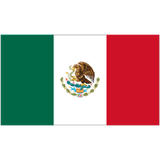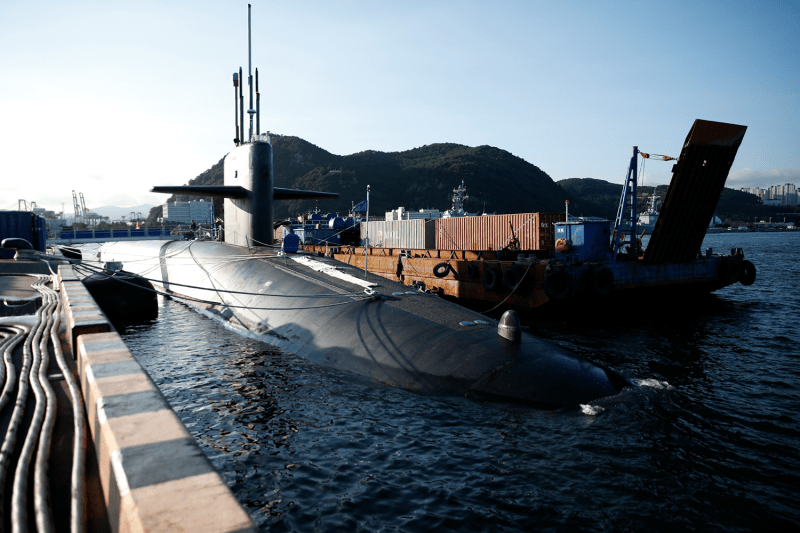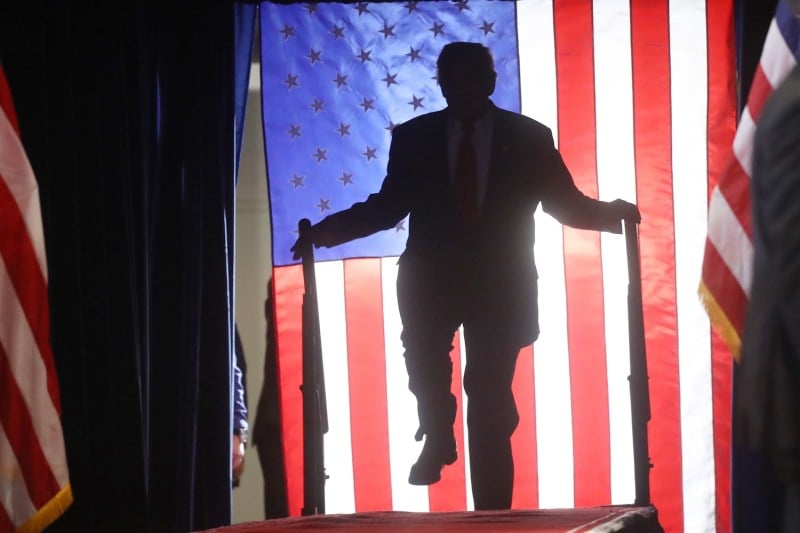How America Blew Its Unipolar Moment

Argument
How America Blew Its Unipolar Moment
An international order founded not on institutions but on hegemonic benevolence proved impossible to sustain.
A man dressed in a U.S. military uniform carries an American flag along a beach in Normandy, France, on June 6, 2017. Chesnot/Getty Images
With the Trump administration taking a wrecking ball to the international order that the United States built, it is unclear what of it will survive. It is worth reflecting on why that order was so fragile.
After the Cold War, the United States had the power and legitimacy to remake the world—but it squandered its unipolar moment. America, in retrospect, repeated the mistakes it made after World War I. In both cases, it did not seek to build and institutionalize a liberal international order, preferring to remain unconstrained. In the post-Cold War order, Washington ran the world. This came with immense benefits to both the United States and, frankly, the world. But the international order depended on U.S. hyper-engagement and hegemonic benevolence that proved difficult to sustain. Ultimately, the biggest challenge to the U.S.-led order is not China but an exhausted United States.
With the Trump administration taking a wrecking ball to the international order that the United States built, it is unclear what of it will survive. It is worth reflecting on why that order was so fragile.
After the Cold War, the United States had the power and legitimacy to remake the world—but it squandered its unipolar moment. America, in retrospect, repeated the mistakes it made after World War I. In both cases, it did not seek to build and institutionalize a liberal international order, preferring to remain unconstrained. In the post-Cold War order, Washington ran the world. This came with immense benefits to both the United States and, frankly, the world. But the international order depended on U.S. hyper-engagement and hegemonic benevolence that proved difficult to sustain. Ultimately, the biggest challenge to the U.S.-led order is not China but an exhausted United States.
The U.S. delegation to the United Nations, including U.S. President Harry Truman, sign the U.N. founding charter in San Francisco on June 25, 1945. Corbis via Getty Images
The concept of a liberal international order is difficult to articulate and therefore to defend. To the realist school of foreign policy, the world order is about power and is inherently anarchic; dreams of an order determined by rules are thus dismissed. But over the past century under U.S. leadership, the anarchy was tamed. An order was built that placed clear constraints on nation-states, with both rules and norms regulating their behavior. There was a U.N. Charter prohibiting states from invading one another and a nonproliferation treaty, as well as a chemical and biological weapons treaty that significantly curbed the development of dangerous weapons. Rules, norms, and codes of conducts governed how states and people interacted with one another and dealt with issues from travel to refugees to health to war. There was a global trading system that created clear standards and rules. The world became much less anarchic, more predictable, and more orderly. This was all backed by U.S. power.
Was this sustainable? International relations scholar G. John Ikenberry argued in his 2001 book, After Victory, that America needed to embrace its enlightened self-interest and to accept some constraints on its power in order to “lock in a favorable postwar order.” By showing strategic restraint, the United States was more likely to “gain the acquiescence of weaker” states as well as prepare for the day when the unipolar moment ended.
This was how the United States approached victory after World War II. The Roosevelt administration was determined not to repeat the mistakes of the interwar period, when Washington rejected the League of Nations and enabled beggar-thy-neighbor economic policies. Before the war was even won, talks took place in 1944 at Dumbarton Oaks in Washington that led to the United Nations and at Bretton Woods in New Hampshire that established the postwar economic order. When the Soviets turned from allies to adversaries and a Cold War emerged, America’s isolationist tendencies were pushed aside, as Presidents Harry Truman and Dwight D. Eisenhower entered into alliances in Europe and Asia, provided massive military and development assistance, and insisted on the integration of Europe.
Yet after victory in the Cold War, there was no comparable U.S. effort to transform the international institutional order along the lines that Ikenberry proposed. There was no effort to dramatically bolster the United Nations, reform the Security Council, or create new robust institutions. Unable to ratify international agreements in the Senate, the United States stood on the outside as treaties including the Convention on the Law of the Sea; the Rome Statute, to establish the International Criminal Court; the Comprehensive Nuclear-Test-Ban Treaty; and the Kyoto Protocol on climate advanced. Sen. Jesse Helms led efforts to withhold U.S. funding for the United Nations, despite the fact that tens of thousands of U.N. peacekeeping forces were increasingly being deployed around the world to keep a lid on conflicts. The global institutions that were formed—such as the Community of Democracies established at the end of the Clinton administration, intended to link and organize democracies around the world—were quickly neglected by the United States. The most significant development in the global political architecture didn’t involve the United States at all, as it came at the regional level, with the formation of the European Union, Mercosur, and the African Union.
By contrast, the United States did seek to advance a universalist liberal economic order. It pushed for trade liberalization and in 1995 helped establish the World Trade Organization (WTO) to manage global trade. This unleashed an era of globalization and economic interconnectedness. The Washington assumption was that democracy and capitalism would reinforce each other and advance organically. The perniciousness of Francis Fukuyama’s “The End of History?” and Thomas L. Friedman’s The Lexus and the Olive Tree was that they let policymakers off the hook. Why build new institutions, entrust the U.N., or sign on to treaties that constrain U.S. power when democracy and capitalism were inevitable? Thus, the vision of order became highly libertarian.
However, as an economic crisis in one country quickly spread to another, it became clear a more interconnected world also needed more international cooperation. The G-20 was formed in 1999 after the Asian financial crisis to somewhat address this. But with nation-states increasingly powerless to cope with global forces, the lack of global governance became increasingly glaring in the 1990s.
Yet the United States at this time was politically divided over multilateralism. This was in fact the major foreign-policy fight of the 1990s. The Clinton administration believed in Wilsonian internationalism and multilateralism but was on the political defensive. Republicans vigorously objected to constraints on U.S. power and railed against international institutions. Where there was alignment was that America was indispensable and should run the world.
For the Clinton administration, international organizations and global governance were justified on tactical grounds—because both were in the U.S. interest. They struggled to offer a grand vision for a reordered world but instead focused U.S. leadership on problem-solving and what seemed like interventionist whack-a-mole in Somalia, Haiti, Bosnia, and Kosovo. This brought complaints of the United States acting as “the world’s policeman” and George W. Bush’s critique during the 2000 campaign that there was too much liberal “nation-building.” America had to lead because it was indispensable, yet that also meant it was doing too much.
British Prime Minister Tony Blair, U.S. President Bill Clinton, French President Jacques René Chirac, and Russian President Boris Yeltsin sit together at the signing of the NATO expansion agreement in Paris on May 27, 1997.Wally McNamee/Corbis via Getty Images
The Clinton administration’s biggest achievement—the expansion of NATO—also exposed this tension. NATO expansion enabled European unification but also cemented America’s positions in Europe, as NATO revolved around the United States. But when faced with a choice about supporting the emergence of the EU as an independent defense and foreign-policy actor, the Clinton administration balked because it was worried about losing influence. Sure, Washington wanted Europe to “share the burden” on defense, but it ultimately prioritized control.
After 9/11, the United States was given another opportunity to remake the world. But instead, U.S. unilateralism was unleashed. The 1990s saw the ascendance of neoconservatives who broadly shared the liberal goals of Wilsonian internationalists but believed the way to do so was unilaterally through U.S. hard power. As Robert Kagan and William Kristol wrote in an influential 1996 essay arguing for a neo-Reaganite foreign policy, the “appropriate goal of American foreign policy, therefore, is to preserve that hegemony as far into the future as possible.” They called for more defense spending and more muscular confrontation with adversarial regimes. The global war on terrorism, drone campaigns, and the invasion of Iraq served to make a mockery of the conceptions of a rules-based international order and greatly eroded global trust in U.S. hegemony, creating room for rivals to emerge and push back.
The Iraq War changed the Republican Party. It turned many of the most patriotic Americans, those who volunteered to serve their country after 9/11—such as J.D. Vance and Pete Hegseth, who ran a veterans’ organization to support the war—not against the war itself but against the liberalism used to justify waging it, along with the notion of using U.S. power and leadership to further a liberal world.
But the Iraq debacle also changed Democrats. It was difficult to articulate a liberal vision for the world when liberal values had been used to justify invading Iraq. President Barack Obama defaulted to a more realist outlook of “don’t do stupid stuff.” That also meant a softened commitment to upholding the international order. Obama’s unwillingness to use direct force against Syria’s Assad regime for its use of chemical weapons was a sign of restraint. But it also showed that the United States would not instinctively hold up the world order even when a critical norm was at stake. America did not feel the same “responsibility to protect” as it did in the 1990s.
Ultimately, Democratic administrations still publicly advocated for international institutions. But when the costs of skirting international norms were intangible and long-term, they rarely won out in White House national security debates. Drip by drip, this took a toll on America’s standing. It sapped U.S. credibility in multilateral forums, where U.S. hypocrisy was used as a cudgel and prompted the United States to engage less. The U.N. is barely ever discussed in Washington today. But as the United States paid less attention, China paid more, making global institutions a tough way to advance a more liberal world. There are now few major efforts to forge an international agreement on cyber, space, or new forms of weapons systems.
Demonstrators protest a Wall Street bailout in New York on Sept. 25, 2008.Nicholas Roberts/AFP via Getty Images
When the global economy collapsed in 2008, it created a sense of U.S. decline and punctured the sense of liberalism’s inevitability. An illiberal wind was now blowing. China seized the moment, expanding its economic engagement with the global south, while autocrats such as Russia’s Vladimir Putin increasingly sought to challenge U.S. hegemony.
Surprisingly, the 2008 crash ultimately did not turn the world against the U.S.-led liberal economic order, but it did turn Americans against it. The Republican-led Senate’s rejection of the Trans-Pacific Partnership in the summer of 2016, followed by both the Trump and Biden administrations’ opposition to the WTO, meant that the United States had turned against the main thrust of its own limited post-Cold War order-building.
Democrats during the first Trump administration imagined the country turning back the illiberal tide by pursuing a “free world” strategy or a “democracy rebalance” to create a democratic bloc. But in office President Joe Biden never fully pursued such an approach. The Summit for Democracy he pledged to hold became a largely pointless “everything-bagel” NGO talk shop instead of an effort to link and organize democracies into a new bloc; it was quickly discarded by the Biden White House. In fairness, the United States may have already lacked the credibility to pull off such an effort. The Biden administration did seek to bring “America back” by embracing familiar allies and structures, reviving the stale G-7, reembracing NATO, and boosting the Quadrilateral Security Dialogue in Asia. Yet typically this all revolved around U.S. hyper-engagement.
Ultimately, though, it is not China that has proved the greatest threat to the U.S.-led order but rather the United States’ willingness to sustain it. U.S. unilateralism put too much of the onus on American shoulders, spurring a reactionary backlash among its people. Should a U.S. administration after Trump seek to salvage what’s left of the liberal order, it is not going to have the clout, credibility, or the opportunity to do so on its own. The unipolar moment is gone.
Max Bergmann is the director of the Center in Euro-Atlantic and Northern European Studies and the Europe, Russia, and Eurasia Program, both at the Center for Strategic and International Studies, and a former senior advisor in the U.S. State Department. X: @maxbergmann
Stories Readers Liked
In Case You Missed It
A selection of paywall-free articles

Four Explanatory Models for Trump’s Chaos
It’s clear that the second Trump administration is aiming for change—not inertia—in U.S. foreign policy.


























Join the Conversation
Commenting is a benefit of a Foreign Policy subscription.
Subscribe
Subscribe
Already a subscriber?
.
View Comments
Join the Conversation
Join the conversation on this and other recent Foreign Policy articles when you subscribe now.
Subscribe
Subscribe
Not your account?
View Comments
Join the Conversation
Please follow our comment guidelines, stay on topic, and be civil, courteous, and respectful of others’ beliefs.
View Comments
Change your username |
Log out
Change your username:
CANCEL
Confirm your username to get started.
The default username below has been generated using the first name and last initial on your FP subscriber account. Usernames may be updated at any time and must not contain inappropriate or offensive language.